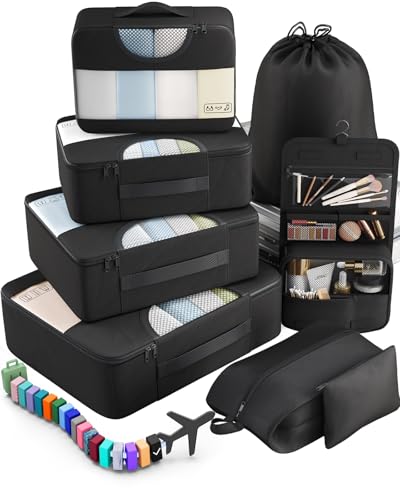In Nigeria, they use Type D and G power plugs and outlets. The voltage is 230V, and the frequency is 50Hz.
So, you’ll need a travel adapter in Nigeria. Their plugs and outlets are different from the Type A and B ones we use back in the States.
Quick Overview of the Plugs in Nigeria:
- Plug type in Nigeria: D and G
- Standard voltage: 230V
- Frequency: 50Hz
- Need a travel adapter? Yes, you do need a travel adapter
- Need a voltage converter? Most devices won’t need one — some might
- Recommended plug adapter: Vintar Universal Travel Adapter Kit
All details are checked against official power guidelines, IEC standards, and real-world input from travelers who’ve been there recently.
The Only Travel Adapter You’ll Need in Nigeria
Picking the wrong travel adapter can leave you stranded with dead devices. We don’t sell them, but we’ve researched the best option for Nigeria, based on voltage, safety, charging speed, and reliability. This one stands out as the best choice:
Recommended Travel Plug Adapter
by 1,000+ travelers on Amazon
If you’re already on your way—or even at your destination—and realized you forgot a power adapter, no big deal. In most countries, you can usually grab one at the airport or pick one up at a nearby shop.
That said, it’s a smart move to get one ahead of time for your next trip. You’ll know it works, skip the last-minute scramble, and avoid getting stuck with a cheap one that might not hold up.
People visiting Nigeria often continue their journey to Niger, Cameroon, and Benin. It’s smart to double-check what adapters are needed.
Power Outlets in Nigeria
In Nigeria, they use Type D and G power plugs and outlets.
Type D

Type D outlets have three large round prongs in a triangular layout and typically only accept Type D plugs, although Type C plugs might fit loosely and are not recommended for safe use.
Type G

Type G outlets have three rectangular prongs in a triangular layout and built-in fuses. Other plug types won’t fit without an adapter.
Do You Need a Voltage Converter?
If the voltage in Nigeria doesn’t align with the 120V used in the U.S., you’ll need a converter to safely use your electronics.
To be on the safe side, always check the voltage label on your electronics before packing for a trip. If you see “100-240V, 50/60 Hz”, your device is safe to use internationally without a voltage converter. This is typical for laptops, tablets, smartphones, cameras, and rechargeable devices.

Which Travel Devices May Need a Converter?
Need a reliable voltage converter? These are the top picks according to real reviews — check them out.
| Device | Need Converter? | Notes |
|---|---|---|
| Phone | ❌ No (usually) | Most modern phone chargers are dual voltage (100–240V) |
| Laptop | ❌ No (usually) | Check the power brick label for 100–240V |
| Hairdryer | ✅ Yes (often) | High wattage; many models are not dual voltage |
| Electric toothbrush | ⚠️ Check voltage | Some models are 110V only |
| Camera / DSLR | ❌ No (usually) | Most chargers are dual voltage |
| Power bank | ❌ No | Charges via USB, adapter is enough |
| Electric shaver / trimmer | ⚠️ Check voltage | Older or cheaper models may not support 230V |
| Tablet / iPad | ❌ No | All models are dual voltage |
| Portable fan | ✅ Yes (sometimes) | Many models are not compatible with 230V |
| Game console | ⚠️ Check voltage | Newer consoles like PS5 and Xbox are often dual voltage — check to be sure |
| Bluetooth speaker | ❌ No (usually) | Charges via USB |
| E-reader (Kindle, etc.) | ❌ No | USB charging only, no converter needed |
Top Travel Essentials to Pack
A good travel experience comes down to the small things. These smart additions can help you avoid last-minute stress and keep your trip on track.
Digital Luggage Scale
Packing Cubes
Power Bank
More About Nigeria
Nigeria is massive—in people, culture, and energy. It’s the most populous country in Africa, with over 250 ethnic groups and a mix of languages, traditions, and landscapes. From the modern cities of Lagos and Abuja to remote villages and rainforest regions, you get a little bit of everything here.
For travelers, Nigeria isn’t a laid-back beach vacation—it’s an adventure. It helps to plan ahead, connect with locals, and stay flexible. Some regions are best avoided due to safety issues, but areas like Lagos, Abuja, and the southwest are common entry points and fairly navigable with common sense and local tips.
What makes Nigeria unforgettable is the raw energy: the music, the food, the confidence. Jollof rice, suya, highlife music, bustling markets—it’s all intense and authentic. If you’re ready for a challenge and want to experience a country on its own terms, Nigeria delivers something real and unlike anywhere else.




